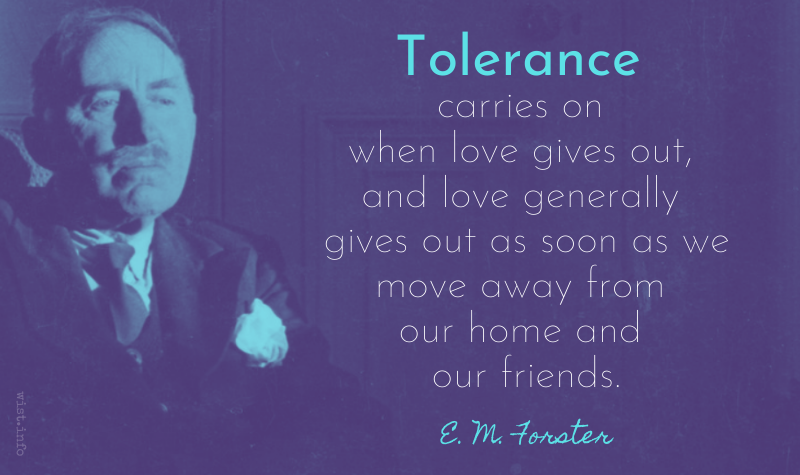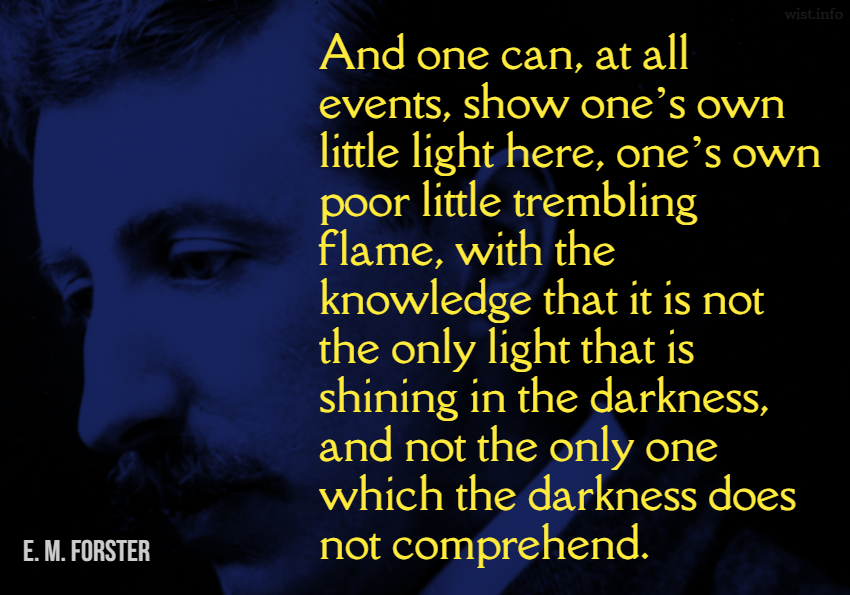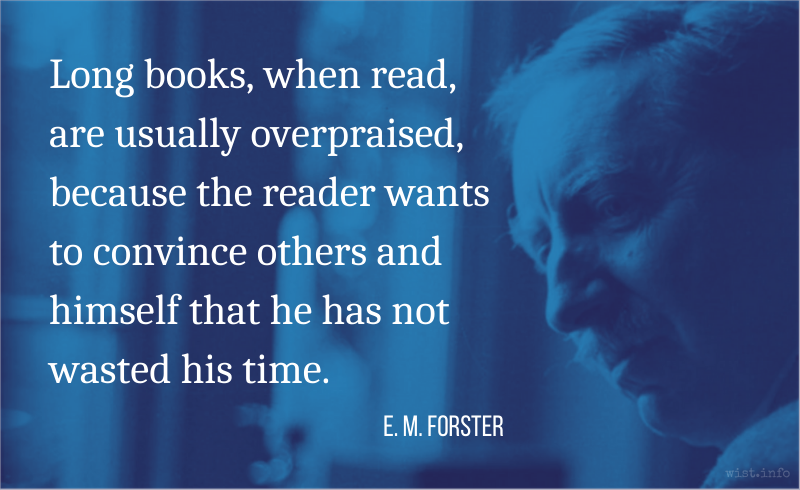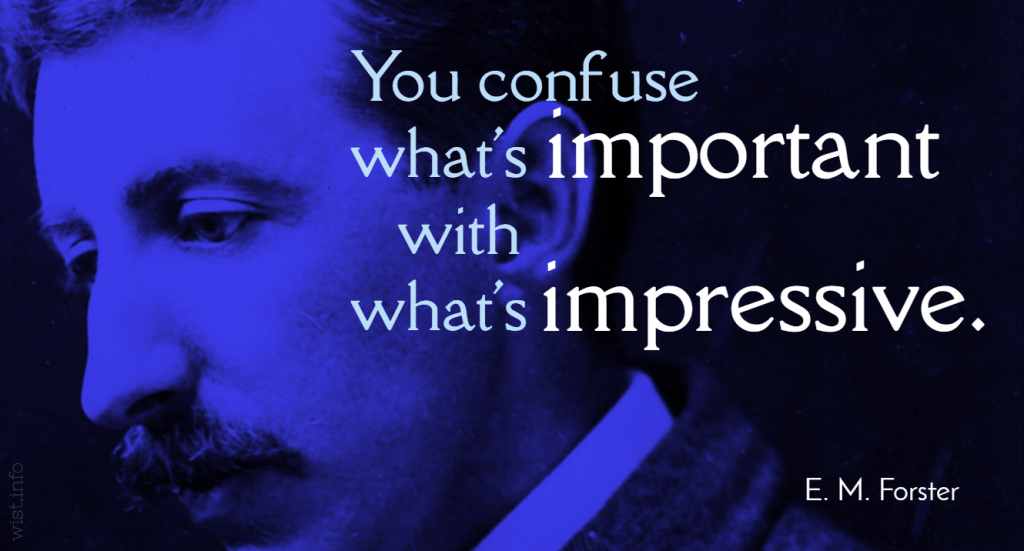The only books that influence us are those for which we are ready, and which have gone a little farther down our particular path than we have yet got ourselves.
Quotations by:
Forster, E. M.
To make us feel small in the right way is a function of art; men can only make us feel small in the wrong way.
E. M. Forster (1879-1970) English novelist, essayist, critic, librettist [Edward Morgan Forster]
“A Book That Influenced Me,” Two Cheers for Democracy (1951)
(Source)
It is only hypocrites who cannot forgive hypocrisy, whereas those who search for truth are too conscious of the maze to be hard on others.
E. M. Forster (1879-1970) English novelist, essayist, critic, librettist [Edward Morgan Forster]
“Albergo Empedocle” (1903)
(Source)
I am quite sure I am not a great novelist because I’ve only got down onto paper really three types of people: the person who I think I am, the people who irritate me, and the people I’d like to be. When you get to the really great people like Tolstoy, you find they can get hold of all types, but most novelists, including myself, are much more constricted in their imaginations and their sympathies.
E. M. Forster (1879-1970) English novelist, essayist, critic, librettist [Edward Morgan Forster]
“E. M. Forster,” Modern Writers: Interviews with Remarkable Authors, BBC (21 Dec 1958)
(Source)
The humanist has four leading characteristics — curiosity, a free mind, belief in good taste, and belief in the human race.
E. M. Forster (1879-1970) English novelist, essayist, critic, librettist [Edward Morgan Forster]
“George and Gide” Two Cheers for Democracy (1951)
(Source)
There is fascism, leading only into the blackness which it has chosen as its symbol, into smartness and yapping out of orders, and self-righteous brutality, into social as well as international war. It means change without hope. Our immediate duty — in that tinkering which is the only useful form of action in our leaky old tub — our immediate duty is to stop it ….
E. M. Forster (1879-1970) English novelist, essayist, critic, librettist [Edward Morgan Forster]
“Notes on the Way,” Time and Tide (10 June 1934)
(Source)
Reprinted in The Prince's Tale and Other Uncollected Writings (1998)
We are willing enough to praise freedom when she is safely tucked away in the past and cannot be a nuisance. In the present, amidst dangers whose outcome we cannot foresee, we get nervous about her, and admit censorship.
E. M. Forster (1879-1970) English novelist, essayist, critic, librettist [Edward Morgan Forster]
“The Tercentenary of the Areopagitica,” Two Cheers for Democracy (1951)
(Source)
[Tolerance] carries on when love gives out, and love generally gives out as soon as we move away from our home and our friends.
E. M. Forster (1879-1970) English novelist, essayist, critic, librettist [Edward Morgan Forster]
“The Unsung Virtue of Tolerance,” radio broadcast (Jul 1941)
(Source)
Published as "Tolerance," Two Cheers for Democracy (1951)
Love is a great force in private life; it is indeed the greatest of all things: but love in public affairs simply does not work. It has been tried again and again: by the Christian civilisations of the Middle Ages, and also by the French Revolution, a secular movement which reasserted the Brotherhood of Man. And it has always failed. The idea that nations should love one another, or that business concerns or marketing boards should love one another, or that a man in Portugal, say, should love a man in Peru of whom he has never heard—it is absurd, it is unreal, worse, it is dangerous. It leads us into perilous and vague sentimentalism. “Love is what is needed,” we chant, and then sit back and the world goes on as before. The fact is we can only love what we know personally. And we cannot know much. In public affairs, in the rebuilding of civilisation, something much less dramatic and emotional is needed, namely, tolerance.
E. M. Forster (1879-1970) English novelist, essayist, critic, librettist [Edward Morgan Forster]
“The Unsung Virtue of Tolerance,” radio broadcast (Jul 1941)
(Source)
Published as "Tolerance," Two Cheers for Democracy (1951)
Tolerance is a very dull virtue. It is boring. Unlike love, it has always had a bad press. It is negative. It merely means putting up with people, being able to stand things. No one has ever written an ode to tolerance, or raised a statue to her. Yet this is the quality which will be most needed after the war. This is the sound state of mind which we are looking for. This is the only force which will enable different races and classes and interests to settle down together to the work of reconstruction.
E. M. Forster (1879-1970) English novelist, essayist, critic, librettist [Edward Morgan Forster]
“The Unsung Virtue of Tolerance,” radio broadcast (Jul 1941)
(Source)
Published as "Tolerance," Two Cheers for Democracy (1951)
The world is very full of people — appallingly full; it has never been so full before — and they are all tumbling over each other. Most of these people one doesn’t know and some of them one doesn’t like; doesn’t like the colour of their skins, say, or the shapes of their noses, or the way they blow them or don’t blow them, or the way they talk, or their smell or their clothes, or their fondness for jazz or their dislike of jazz, and so on. Well, what is one to do?
There are two solutions. One of them is the Nazi solution. If you don’t like people, kill them, banish them, segregate them, and then strut up and down proclaiming that you are the salt of the earth.
The other way is much less thrilling, but it is on the whole the way of the democracies, and I prefer it. If you don’t like people, put up with them as well as you can. Don’t try to love them; you can’t, you’ll only strain yourself. But try to tolerate them. On the basis of that tolerance a civilised future may be built.
E. M. Forster (1879-1970) English novelist, essayist, critic, librettist [Edward Morgan Forster]
“The Unsung Virtue of Tolerance,” radio broadcast (Jul 1941)
(Source)
Published as "Tolerance," Two Cheers for Democracy (1951)
I have no more faith in positive militant ideals; they can so seldom be carried out without thousands of human beings getting maimed or imprisoned. Phrases like “I will purge this nation,” “I will clean up this city,” terrify and disgust me. They might not have mattered so much when the world was emptier: they are horrifying now, when one nation is mixed up with another, when one city cannot be organically separated from its neighbours.
E. M. Forster (1879-1970) English novelist, essayist, critic, librettist [Edward Morgan Forster]
“The Unsung Virtue of Tolerance,” radio broadcast (Jul 1941)
(Source)
Published as "Tolerance," Two Cheers for Democracy (1951).
Tolerance, I believe, will be imperative after the establishment of peace. It’s always useful to take a concrete instance: and I have been asking myself how I should behave if, after peace was signed, I met Germans who had been fighting against us. I shouldn’t try to love them: I shouldn’t feel inclined. They have broken a window in my little ugly flat for one thing, and they have done other things which I need not specify. But I shall try to tolerate them, because it is common-sense, because in the post-war world we shall have to live with Germans […] not for any lofty reason, but because it is the next thing that will have to be done.
E. M. Forster (1879-1970) English novelist, essayist, critic, librettist [Edward Morgan Forster]
“The Unsung Virtue of Tolerance,” radio broadcast, BBC (Jul 1941)
(Source)
Published as "Tolerance," Two Cheers for Democracy (1951).
I hate the idea of causes, and if I had to choose between betraying my country and betraying my friend, I hope I should have the guts to betray my country.
E. M. Forster (1879-1970) English novelist, essayist, critic, librettist [Edward Morgan Forster]
“What I Believe,” The Nation (16 Jul 1938)
(Source)
Sometimes misquoted as: "If I had to choose between betraying my country and betraying my friend, I hope I should have the decency to betray my country."
Tolerance, good temper and sympathy — they are what matter really, and if the human race is not to collapse they must come to the front before long.
E. M. Forster (1879-1970) English novelist, essayist, critic, librettist [Edward Morgan Forster]
“What I Believe,” The Nation (16 Jul 1938)
(Source)
One must be fond of people and trust them if one is not to make a mess of life, and it is therefore essential that they should not let one down. They often do. The moral of which is that I must, myself, be as reliable as possible, and this I try to be. But reliability is not a matter of contract — that is the main difference between the world of personal relationships and the world of business relationships. It is a matter for the heart, which signs no documents. In other words, reliability is impossible unless there is a natural warmth. Most men possess this warmth, though they often have bad luck and get chilled. Most of them, even when they are politicians, want to keep faith. And one can, at all events, show one’s own little light here, one’s own poor little trembling flame, with the knowledge that it is not the only light that is shining in the darkness, and not the only one which the darkness does not comprehend.
E. M. Forster (1879-1970) English novelist, essayist, critic, librettist [Edward Morgan Forster]
“What I Believe,” The Nation (16 Jul 1938)
(Source)
There lies at the back of every creed something terrible and hard for which the worshipper may one day be required to suffer.
E. M. Forster (1879-1970) English novelist, essayist, critic, librettist [Edward Morgan Forster]
“What I Believe,” The Nation (16 Jul 1938)
(Source)
Democracy is not a beloved Republic really, and never will be. But it is less hateful than other contemporary forms of government, and to that extent it deserves our support. It does start from the assumption that the individual is important, and that all types are needed to make a civilization. It does not divide its citizens into the bossers and the bossed — as an efficiency-regime tends to do. The people I admire most are those who are sensitive and want to create something or discover something, and do not see life in terms of power, and such people get more of a chance under a democracy than elsewhere. They found religions, great or small, or they produce literature and art, or they do disinterested scientific research, or they may be what is called “ordinary people”, who are creative in their private lives, bring up their children decently, for instance, or help their neighbours. All these people need to express themselves; they cannot do so unless society allows them liberty to do so, and the society which allows them most liberty is a democracy.
E. M. Forster (1879-1970) English novelist, essayist, critic, librettist [Edward Morgan Forster]
“What I Believe,” The Nation (16 Jul 1938)
(Source)
Whether Parliament is either a representative body or an efficient one is questionable, but I value it because it criticizes and talks, and because its chatter gets widely reported. So two cheers for Democracy: one because it admits variety and two because it permits criticism. Two cheers are quite enough: there is no occasion to give three.
E. M. Forster (1879-1970) English novelist, essayist, critic, librettist [Edward Morgan Forster]
“What I Believe,” The Nation (16 Jul 1938)
(Source)
I realize that all society rests upon force. But all the great creative actions, all the decent human relations, occur during the intervals when force has not managed to come to the front. These intervals are what matter. I want them to be as frequent and as lengthy as possible, and I call them “civilization”.
E. M. Forster (1879-1970) English novelist, essayist, critic, librettist [Edward Morgan Forster]
“What I Believe,” The Nation (16 Jul 1938)
(Source)
Some people idealize force and pull it into the foreground and worship it, instead of keeping it in the background as long as possible. I think they make a mistake, and I think that their opposites, the mystics, err even more when they declare that force does not exist. I believe that it exists, and that one of our jobs is to prevent it from getting out of its box. It gets out sooner or later, and then it destroys us and all the lovely things which we have made. But it is not out all the time, for the fortunate reason that the strong are so stupid.
The people I respect most behave as if they were immortal and as if society was eternal. Both assumptions are false: both of them must be accepted as true if we are to go on eating and working and loving, and are to keep open a few breathing-holes for the human spirit. No millennium seems likely to descend upon humanity; no better and stronger League of Nations will be instituted; no form of Christianity and no alternative to Christianity will bring peace to the world or integrity to the individual; no “change of heart” will occur. And yet we need not despair, indeed, we cannot despair; the evidence of history shows us that men have always insisted on behaving creatively under the shadow of the sword; that they have done their artistic and scientific and domestic stuff for the sake of doing it, and that we had better follow their example under the shadow of the aeroplanes.
E. M. Forster (1879-1970) English novelist, essayist, critic, librettist [Edward Morgan Forster]
“What I Believe,” The Nation (16 Jul 1938)
(Source)
Certainly it is presumptuous to say that we cannot improve, and that Man, who has only been in power for a few thousand years, will never learn to make use of his power. All I mean is that, if people continue to kill one another as they do, the world cannot get better than it is, and that, since there are more people than formerly, and their means for destroying one another superior, the world may well get worse. What is good in people — and consequently in the world — is their insistence on creation, their belief in friendship and loyalty for their own sakes; and, though Violence remains and is, indeed, the major partner in this muddled establishment, I believe that creativeness remains too, and will always assume direction when violence sleeps.
E. M. Forster (1879-1970) English novelist, essayist, critic, librettist [Edward Morgan Forster]
“What I Believe,” The Nation (16 Jul 1938)
(Source)
I distrust Great Men. They produce a desert of uniformity around them and often a pool of blood too, and I always feel a little man’s pleasure when they come a cropper.
E. M. Forster (1879-1970) English novelist, essayist, critic, librettist [Edward Morgan Forster]
“What I Believe,” The Nation (16 Jul 1938)
(Source)
As soon as people have power they go crooked and sometimes dotty as well, because the possession of power lifts them into a region where normal honesty never pays.
E. M. Forster (1879-1970) English novelist, essayist, critic, librettist [Edward Morgan Forster]
“What I Believe,” The Nation (16 Jul 1938)
(Source)
See Lord Acton.
I believe in aristocracy, though — if that is the right word, and if a democrat may use it. Not an aristocracy of power, based upon rank and influence, but an aristocracy of the sensitive, the considerate and the plucky. Its members are to be found in all nations and classes, and all through the ages, and there is a secret understanding between them when they meet. They represent the true human tradition, the one permanent victory of our queer race over cruelty and chaos. Thousands of them perish in obscurity, a few are great names. They are sensitive for others as well as for themselves, they are considerate without being fussy, their pluck is not swankiness but the power to endure, and they can take a joke.
I probably differ from most people, who believe in Belief, and are only sorry they cannot swallow even more than they do. My law-givers are Erasmus and Montaigne, not Moses and St. Paul.
E. M. Forster (1879-1970) English novelist, essayist, critic, librettist [Edward Morgan Forster]
“What I Believe,” The Nation (16 Jul 1938)
(Source)
Most of life is so dull that there is nothing to be said about it, and the books and talks that would describe it as interesting are obliged to exaggerate, in the hope of justifying their own existence. Inside its cocoon of work or social obligation, the human spirit slumbers for the most part, registering the distinction between pleasure and pain, but not nearly as alert as we pretend. There are periods in the most thrilling day during which nothing happens, and though we continue to exclaim, “I do enjoy myself,” or, “I am horrified,” we are insincere. “As far as I feel anything, it is enjoyment, horror” — it’s no more than that, really, and a perfectly adjusted organism would be silent.
E. M. Forster (1879-1970) English novelist, essayist, critic, librettist [Edward Morgan Forster]
A Passage to India, ch. 14 (1924)
(Source)
Life never gives us what we want at the moment that we consider appropriate. Adventures do occur, but not punctually.
E. M. Forster (1879-1970) English novelist, essayist, critic, librettist [Edward Morgan Forster]
A Passage to India, ch. 3 (1924)
(Source)
There’s enough sorrow in the world, isn’t there, without trying to invent it.
E. M. Forster (1879-1970) English novelist, essayist, critic, librettist [Edward Morgan Forster]
A Room with a View, ch 2 (1908)
(Source)
Life is easy to chronicle, but bewildering to practice.
E. M. Forster (1879-1970) English novelist, essayist, critic, librettist [Edward Morgan Forster]
A Room with a View, ch. 14 (1908)
(Source)
Our life on earth is, and ought to be, material and carnal. But we have not yet learned to manage our materialism and carnality properly; they are still entangled with the desire for ownership.
Long books, when read, are usually overpraised, because the reader wants to convince others and himself that he has not wasted his time.
E. M. Forster (1879-1970) English novelist, essayist, critic, librettist [Edward Morgan Forster]
Commonplace Book (1985) [ed. Gardner]
(Source)
Self-pity? I see no moral objections to it, the smell drives people away, but that’s a practical objection, and occasionally an advantage.
E. M. Forster (1879-1970) English novelist, essayist, critic, librettist [Edward Morgan Forster]
Commonplace Book (1985) [ed. Gardner]
(Source)
You confuse what’s important with what’s impressive.
E. M. Forster (1879-1970) English novelist, essayist, critic, librettist [Edward Morgan Forster]
Maurice (w. 1914, pub. 1971)
(Source)
I suggest that the only books that influence us are those for which we are ready, and which have gone a little farther down our particular path than we have yet got ourselves.
The only books that influence us are those for which we are ready, and which have gone a little farther down our particular path than we have yet got ourselves.
The newspapers still talk about glory but the average man, thank God, has got rid of that illusion. It is a damned bore, with a stalemate as the most probable outcome, but one has to see it through, and see it through with the knowledge that whichever side wins, civilisation in Europe will be pipped for the next 30 years. Don’t indulge in Romance here, Malcolm, or suppose that an era of jolly little nationalities is dawning. We shall be much too much occupied with pestilence and poverty to reconstruct.
E. M. Forster (1879-1970) English novelist, essayist, critic, librettist [Edward Morgan Forster]
Letter to Malcolm Darling (6 Nov 1914)
(Source)
M. says he would much rather be a coward than brave because people hurt you when you are brave …
E. M. Forster (1879-1970) English novelist, essayist, critic, librettist [Edward Morgan Forster]
Quoted by Alice Forster in a letter (1883)
(Source)
Ellipsis in original. Forster was 4 years old at the time. In P. N. Furbank, E. M. Forster: The growth of the novelist (1879-1914) (1977).





